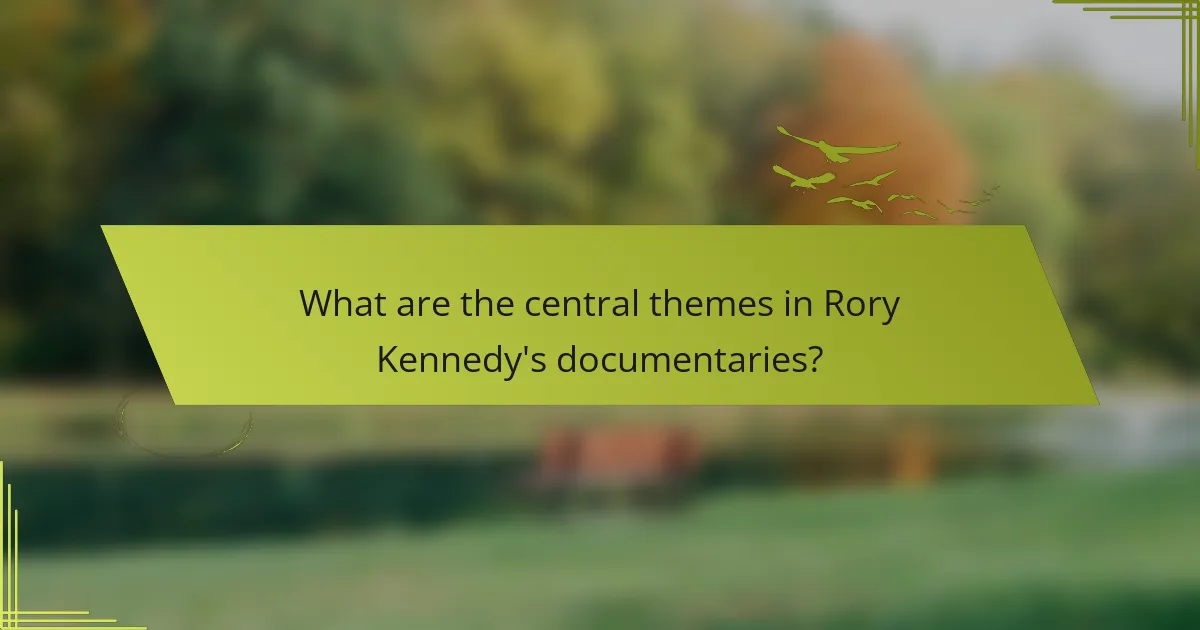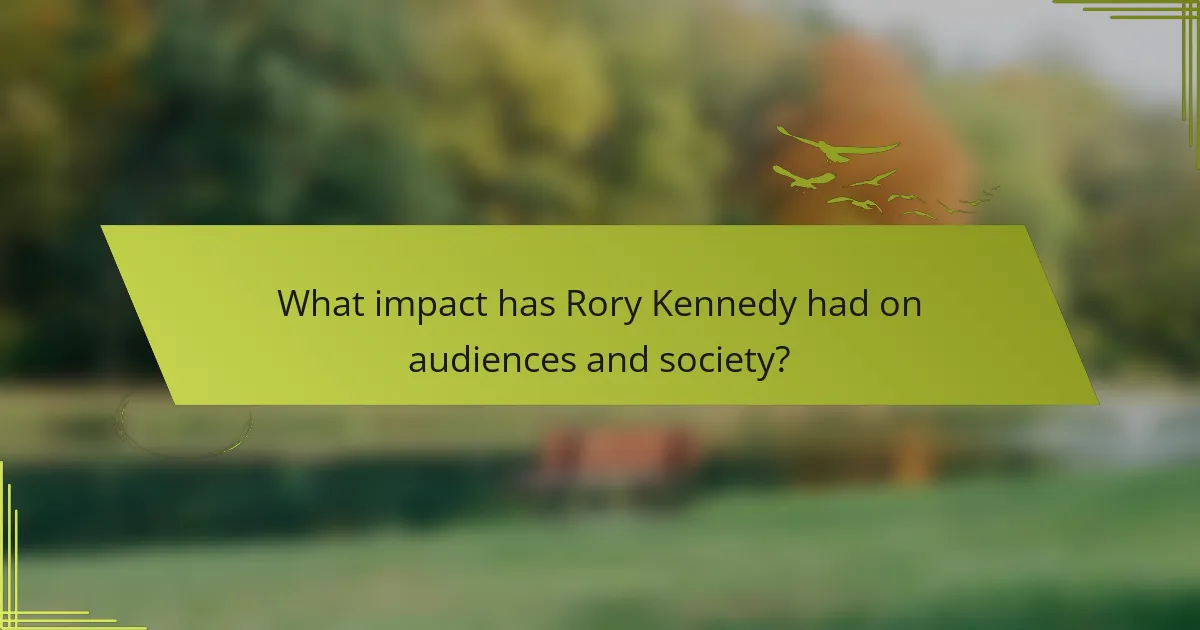
What is the Narrative Power of Rory Kennedy?
Rory Kennedy’s narrative power lies in her ability to illuminate human rights and social justice issues through documentary filmmaking. She crafts compelling stories that resonate emotionally with audiences. Kennedy often focuses on marginalized communities and underreported issues. Her films challenge viewers to confront difficult realities. For example, “Last Days in Vietnam” highlights the moral complexities of war and its aftermath. This documentary received an Academy Award nomination, showcasing her impactful storytelling. Kennedy’s work encourages empathy and action, making her a significant voice in documentary cinema. Her unique perspective stems from her family’s legacy in public service and activism.
How does Rory Kennedy’s work embody human rights and social justice themes?
Rory Kennedy’s work embodies human rights and social justice themes through her documentary filmmaking. She focuses on marginalized communities and highlights their struggles. Her films often address issues like poverty, war, and inequality. For example, “Last Days in Vietnam” explores the impact of the Vietnam War on civilians. Kennedy uses personal stories to evoke empathy and raise awareness. Her storytelling emphasizes the importance of activism and social change. By showcasing real-life experiences, she advocates for justice and human rights. Kennedy’s commitment to these themes is evident in her body of work.
What are the key documentaries that showcase her narrative power?
Key documentaries that showcase Rory Kennedy’s narrative power include “Last Days in Vietnam,” “The Ghosts of Abu Ghraib,” and “American Hollow.” “Last Days in Vietnam” highlights the complexities of the Vietnam War’s end, focusing on human stories. It received an Academy Award nomination, underscoring its impact. “The Ghosts of Abu Ghraib” explores the human rights violations in Iraq, prompting discussions on ethics and accountability. This film won the Emmy Award for Outstanding Nonfiction Special. “American Hollow” addresses the struggles of families affected by the opioid crisis, showcasing personal narratives that resonate deeply. Each documentary exemplifies her ability to elevate social justice issues through compelling storytelling.
How has her background influenced her storytelling approach?
Rory Kennedy’s background has significantly influenced her storytelling approach. Growing up in a politically active family, she was exposed to social justice issues early on. Her experiences in various cultures have shaped her understanding of human rights. Kennedy’s education in documentary filmmaking has equipped her with technical skills. She combines personal narratives with broader social themes in her work. This blend creates a powerful emotional impact. Her documentaries often highlight marginalized voices. This focus reflects her commitment to advocacy and social change.
Why is Rory Kennedy’s narrative style significant in documentary filmmaking?
Rory Kennedy’s narrative style is significant in documentary filmmaking because it effectively combines personal storytelling with social justice themes. Her approach humanizes complex issues, making them relatable to audiences. Kennedy often incorporates first-person perspectives, which create emotional connections. This technique allows viewers to engage deeply with the subject matter. Additionally, her use of immersive visuals enhances storytelling. Kennedy’s documentaries often highlight underrepresented voices, bringing attention to critical human rights issues. This focus on marginalized perspectives elevates the discourse around social justice. Her narrative style has garnered acclaim for its authenticity and impact.
What techniques does she use to engage audiences on social issues?
Rory Kennedy engages audiences on social issues through personal storytelling and emotional resonance. She often highlights individual experiences to create a connection with viewers. This approach makes complex issues more relatable and understandable. Kennedy uses visuals to enhance her narratives, capturing raw emotions and impactful moments. She incorporates interviews with affected individuals, providing authentic perspectives. Additionally, her documentaries often include compelling statistics to back up personal stories. This combination of narrative techniques fosters empathy and encourages audience reflection. Overall, her methods effectively raise awareness and inspire action on social justice issues.
How does her narrative style differ from other documentary filmmakers?
Rory Kennedy’s narrative style is characterized by an intimate and personal approach. She often focuses on individual stories to highlight broader social issues. This contrasts with many documentary filmmakers who may adopt a more objective or detached perspective. Kennedy’s use of first-person narration creates a connection between the audience and her subjects. She emphasizes emotional storytelling to evoke empathy and provoke thought. Her documentaries frequently incorporate direct interviews, allowing subjects to share their experiences in their own words. This method fosters authenticity and trust. Additionally, Kennedy often addresses complex human rights issues through a lens of personal struggle. This unique blend of personal narrative and social commentary sets her apart in the documentary filmmaking landscape.

What are the central themes in Rory Kennedy’s documentaries?
Rory Kennedy’s documentaries primarily focus on human rights and social justice. They explore issues such as poverty, war, and environmental challenges. Kennedy often highlights marginalized voices and their struggles. Her films emphasize the importance of activism and community engagement. They aim to raise awareness and inspire change. For instance, her documentary “Last Days in Vietnam” examines the impact of the Vietnam War on individuals. Another film, “American Hollow,” addresses the struggles faced by the homeless. These themes reflect Kennedy’s commitment to social issues and her desire to provoke thought and action.
How does she address human rights violations in her films?
Rory Kennedy addresses human rights violations in her films through powerful storytelling and firsthand accounts. She highlights the experiences of marginalized communities affected by injustice. Her documentaries often feature interviews with victims and activists. This approach personalizes the impact of human rights abuses. Kennedy employs visual evidence to illustrate the severity of these violations. Her films often include historical context to deepen understanding. By showcasing grassroots movements, she emphasizes the importance of advocacy. This method fosters empathy and encourages viewers to engage with social justice issues.
What specific human rights issues are highlighted in her documentaries?
Rory Kennedy’s documentaries highlight various specific human rights issues, including women’s rights, poverty, and war crimes. Her works often focus on the struggles of marginalized communities. For instance, she addresses the impact of violence against women in conflict zones. Kennedy also explores the challenges faced by refugees and internally displaced persons. Additionally, her films shed light on systemic injustices related to economic inequality. By documenting these issues, she raises awareness and advocates for social justice. Her film “Last Days in Vietnam” specifically examines the human rights violations during the Vietnam War. Overall, Kennedy’s documentaries serve as powerful narratives that illuminate pressing human rights concerns.
How do her documentaries contribute to public awareness of these issues?
Rory Kennedy’s documentaries raise public awareness of human rights and social justice issues. They highlight underreported stories and marginalized voices. By using compelling narratives, her films engage viewers emotionally. This emotional connection prompts audiences to reflect on societal injustices. Statistics show that documentaries can increase knowledge and empathy regarding specific issues. For example, her film “Last Days in Vietnam” sparked discussions about the Vietnam War’s legacy. Kennedy’s work often includes interviews with affected individuals, providing personal insights. This approach humanizes complex issues, making them relatable to a broader audience. Overall, her documentaries serve as powerful tools for education and advocacy.
In what ways does Rory Kennedy promote social justice through her work?
Rory Kennedy promotes social justice through her documentaries that highlight marginalized communities. She focuses on issues such as poverty, human rights, and gender equality. Kennedy’s films often feature personal stories that evoke empathy and understanding. This narrative approach raises awareness about systemic injustices. Her work encourages viewers to engage with social issues actively. For instance, her documentary “Last Days in Vietnam” showcases the plight of refugees. This film emphasizes the moral responsibility to assist those in need. Kennedy’s commitment to social justice is evident in her advocacy for policy changes. Her storytelling empowers audiences to advocate for change.
What stories does she tell that exemplify social justice advocacy?
Rory Kennedy tells stories that highlight marginalized voices and systemic injustices. One example is her documentary “Last Days in Vietnam,” which showcases the plight of Vietnamese refugees during the Vietnam War. This film emphasizes the moral dilemmas faced by American soldiers and the urgent need for humanitarian action. Another significant work is “American Hollow,” which addresses issues of poverty and inequality in the U.S. It portrays the struggles of families living in dire conditions. Kennedy’s narratives often focus on the intersection of personal stories and broader social issues. These stories exemplify her commitment to social justice advocacy by raising awareness and inspiring action.
How does she collaborate with communities affected by the issues she films?
Rory Kennedy collaborates with communities affected by the issues she films by engaging them in the filmmaking process. She conducts interviews to gather personal stories and perspectives. This approach ensures that the narratives reflect the experiences of those directly impacted. Kennedy often holds community screenings to facilitate discussion and feedback. She emphasizes building trust and relationships with the subjects of her films. This collaboration empowers communities by giving them a voice. Her films aim to raise awareness and promote social change based on these authentic narratives. By prioritizing community involvement, Kennedy enhances the impact and relevance of her work.

What impact has Rory Kennedy had on audiences and society?
Rory Kennedy has significantly influenced audiences and society through her documentary filmmaking. Her works often highlight critical social justice issues. They raise awareness about human rights violations and marginalized communities. Kennedy’s films encourage public discourse and empathy. For instance, “Last Days in Vietnam” received an Academy Award nomination. This film sparked conversations about the Vietnam War’s impact on individuals. Her storytelling style connects viewers emotionally to complex subjects. Kennedy’s impact extends to inspiring activism and advocacy among her audience.
How do viewers respond to her documentaries?
Viewers respond positively to Rory Kennedy’s documentaries. They often praise her ability to highlight pressing social issues. Many find her storytelling compelling and emotionally engaging. Reviews frequently mention the impact of her work on raising awareness. Audience feedback indicates a strong connection to the subjects she portrays. Viewers appreciate her focus on human rights and social justice. This response is reflected in high viewer ratings and critical acclaim. Her documentaries often spark conversations and inspire action among audiences.
What evidence exists of her documentaries inspiring social change?
Rory Kennedy’s documentaries have inspired social change through heightened awareness and advocacy. For example, her film “Last Days in Vietnam” sparked discussions on U.S. foreign policy and refugee rights. The documentary received an Academy Award nomination, increasing its visibility. This recognition led to public forums and debates about the Vietnam War’s legacy. Additionally, her work on “American Hollow” highlighted the struggles of marginalized communities. This film prompted local activism and policy changes regarding housing and social services. Kennedy’s films often lead to partnerships with NGOs, amplifying their impact on social issues. These collaborations have resulted in tangible changes in legislation and community support initiatives.
How do critics and scholars assess her contributions to documentary filmmaking?
Critics and scholars assess Rory Kennedy’s contributions to documentary filmmaking as significant and impactful. They highlight her ability to address complex social issues through a narrative lens. Her films often focus on human rights and social justice themes. Critics praise her innovative storytelling techniques. Scholars note her commitment to giving voice to marginalized communities. Her work has received numerous accolades, reinforcing her influence in the genre. For example, her documentary “Last Days in Vietnam” was nominated for an Academy Award. This recognition underscores her skill in blending personal stories with broader societal issues. Overall, her contributions are viewed as essential to the evolution of documentary filmmaking.
What lessons can be learned from Rory Kennedy’s approach to documentary filmmaking?
Rory Kennedy’s approach to documentary filmmaking emphasizes the importance of personal storytelling. She often focuses on marginalized voices to highlight social issues. This method fosters empathy and connection with audiences. Kennedy’s films are grounded in thorough research and fact-checking. This commitment to accuracy enhances credibility. She utilizes a strong narrative structure to engage viewers effectively. Kennedy’s work also showcases the impact of social justice movements. By addressing complex topics, she encourages critical thinking and dialogue. These lessons underscore the significance of authenticity and advocacy in documentary filmmaking.
What best practices can emerging filmmakers adopt from her narrative techniques?
Emerging filmmakers can adopt several best practices from Rory Kennedy’s narrative techniques. First, they should focus on authenticity in storytelling. Kennedy often highlights real human experiences to create emotional connections. Second, they can employ a strong thematic focus. Her documentaries center on social justice issues, providing clarity and purpose. Third, filmmakers should prioritize character-driven narratives. Kennedy’s work features compelling individuals whose stories drive the film’s message. Fourth, using immersive visuals can enhance storytelling. She utilizes striking imagery to engage audiences deeply. Finally, filmmakers should be mindful of pacing and structure. Kennedy’s films maintain a rhythm that keeps viewers invested in the narrative. These practices can help emerging filmmakers craft impactful and resonant stories.
How can filmmakers effectively use storytelling to advocate for social justice?
Filmmakers can effectively use storytelling to advocate for social justice by creating compelling narratives that highlight social issues. They can focus on personal stories that humanize abstract concepts. This approach fosters empathy and understanding among viewers. By showcasing real-life experiences, filmmakers can illustrate the impact of social injustices. For example, documentaries like those by Rory Kennedy reveal the struggles faced by marginalized communities. Such narratives can mobilize audiences and inspire action. Research shows that storytelling can significantly influence public perception and policy change. Engaging visuals and emotional arcs can enhance the message’s resonance. Overall, effective storytelling serves as a powerful tool for social advocacy.
The main entity of the article is Rory Kennedy, a documentary filmmaker renowned for her focus on human rights and social justice. The article explores Kennedy’s narrative power through her impactful storytelling, which emphasizes the struggles of marginalized communities and underreported issues. Key documentaries such as “Last Days in Vietnam” and “The Ghosts of Abu Ghraib” are highlighted, showcasing her unique approach that combines personal narratives with broader social themes. Additionally, the article discusses how her background influences her work and the techniques she employs to engage audiences, ultimately promoting social change and raising awareness of critical human rights issues.